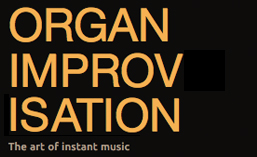For the month of May, I’d like to offer a little series on what I call the Four C’s of Improvisation. Every improvisation must be competent, convincing, coherent and colorful. Each week I’ll explore one of the topics and offer some guidance on ways to enhance the topic of choice through your practice.
The first ‘C’ is about being competent. This is perhaps the broadest area to cover and I feel aside from fear, the largest obstacle to improvising.
Competency at the Organ
Firstly, the improviser must know the instrument. It is perfectly acceptable to try out new registrations in practice, but pulling an untested combination of stops during a public improvisation can create problems: an intended solo may be too soft or may completely dominate the texture. This can force changes in form or loss of mental focus which can lead to many other difficulties.
Pushing an incorrect piston during an improvisation can be just as startling as doing so while performing a written composition. Many performers will practice a passage repeatedly in order to get the stop changes timed properly. If we are intentional about what we are improvising, we should be able to do the same sort of practice. Choose a texture to practice where you might like to change the registration and then repeat the idea until you are comfortable adding the stop(s), removing the stop(s), or pushing the piston, or perhaps all three! Perhaps the easiest way to get a registration changed is to include a rest, so don’t be afraid of the silence.
Technical Competency
Most of us probably started at the piano and went through a period of learning to play scales, arpeggios, chords and cadences. There are many piano technical method books out there (Hanon, Czerny, Schmitt, and Dohnanyi for example) and most organ method books include pedal exercises for beginners with a few other more advanced specific pedal technique books (Jones and Nilson for example). Having a fabulous musical idea but not being able to execute it can be the death of an improvisation. As I add to organimprovisation.com, I hope to present some exercises that can be practiced for technique, but will easily be adapted into musical compositions.
Musical Competency
Here is where formal instruction in harmony, counterpoint, and style are helpful. All of these skills can be practiced both at the organ and with pen and paper. An important skill for any improviser is knowing what the notes will sound like before you press the keys down. Completing pen and paper exercises can not only train you in harmony, counterpoint and form, but also develop your inner ear which can be most helpful should your fingers begin to wander! There are many websites now offering basic theory instruction. Some of the ones that seem most useful to me include: teoria.com, www.8notes.com, and www.berkleeshares.com. If you have or discover other on-line resources, please feel free to share with me so I can pass them along to everyone!
Next week, we’ll explore ways to be convincing while improvising.
May all your improvs be competent!
Glenn Osborne
Recent additions to organimprovisation.com:
Artists:
Themes:
Newsletter Issue 2 – 2014 05 05
See the complete list of past newsletter issues here.
Sign up to receive future issues using the box to the right on this page.
